See also
Contents
| This disambiguation page lists articles associated with the title Laing. If an internal link led you here, you may wish to change the link to point directly to the intended article. |
Laing may refer to:
| This disambiguation page lists articles associated with the title Laing. If an internal link led you here, you may wish to change the link to point directly to the intended article. |
Link or Links may refer to:
Crane or cranes may refer to:
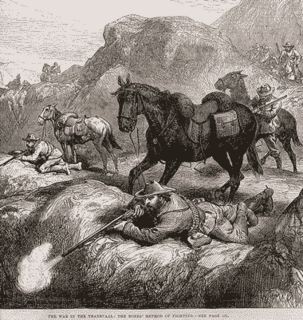
The First Boer War, also known as the First Anglo-Boer War, the Transvaal War or the Transvaal Rebellion, was a war fought from 16 December 1880 until 23 March 1881 between the United Kingdom and Boers of the Transvaal. The war resulted in Britain’s accession to the establishment of the Second Republic.
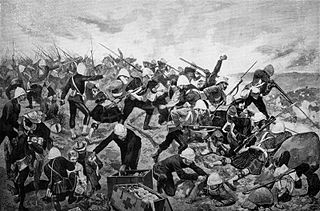
The Battle of Majuba Hill on 27 February 1881 was the final and decisive battle of the First Boer War. It was a resounding victory for the Boers and the battle is considered to have been one of the most humiliating defeats of British arms in history. Maj. Gen. Sir George Pomeroy Colley occupied the summit of the hill on the night of 26–27 February 1881. Colley's motive for occupying Majuba Hill may have been anxiety that the Boers would soon occupy it themselves, Colley having witnessed their trenches being dug in the direction of the hill. The Boers believed that he might have been attempting to outflank their positions at Laing's Nek. The hill was not considered to be scalable by the Boers, for military purposes, and hence it may have been Colley's attempt to emphasise British power and strike fear into the Boer camp.

Alan Richard Hill VC was an English recipient of the Victoria Cross, the highest and most prestigious award for gallantry in the face of the enemy that can be awarded to British and Commonwealth forces.

Volksrust is a town in the Mpumalanga province of South Africa near the KwaZulu-Natal provincial border, some 240 km southeast of Johannesburg, 53 km north of Newcastle and 80 km southeast of Standerton.
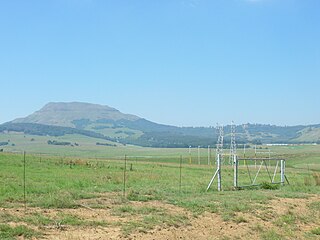
Laing's Nek, or Lang's Nek is a pass through the Drakensberg, South Africa, immediately north of Majuba, at 27°27′39″S29°52′10″E at an elevation of 5400 to 6,000 ft (1,800 m). It is the lowest part of a ridge which slopes from Majuba to the Buffalo River, and before the opening of the railway in 1891 the road over the nek was the main artery of communication between Durban and Pretoria. The railway crosses the pass via a 2,213 ft (675 m). long tunnel.
The following lists events that happened during 1881 in South Africa.

The Battle of Hlobane took place at Hlobane, near the modern town of Vryheid in KwaZulu-Natal, South Africa during the Anglo-Zulu War.
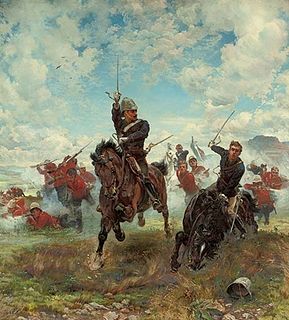
The Battle of Laing's Nek was a major battle fought at Laing's Nek during the First Boer War on 28 January 1881.
Barlow may refer to:
John Laing Group plc is a British investor, developer and operator of privately financed, public sector infrastructure projects such as roads, railways, hospitals and schools through Public-Private Partnership (PPP) and Private Finance Initiative (PFI) arrangements. It is listed on the London Stock Exchange and is a constituent of the FTSE 250 Index.

The 1st King's Dragoon Guards was a cavalry regiment in the British Army. The regiment was raised by Sir John Lanier in 1685 as the 2nd Queen's Regiment of Horse, named in honour of Queen Mary, consort of King James II. It was renamed the 2nd King's Own Regiment of Horse in 1714 in honour of George I. The regiment attained the title 1st King's Dragoon Guards in 1751. The regiment served as horse cavalry until 1937 when it was mechanised with light tanks. The regiment became part of the Royal Armoured Corps in 1939. After service in the First World War and the Second World War, the regiment amalgamated with the 2nd Dragoon Guards in 1959 to form the 1st The Queen's Dragoon Guards.
Go, G.O., or Go! may refer to:
Laing is a Scottish surname, commonly found in countries settled by Scots, such as Canada and New Zealand. It is a descriptive surname, cognate with the English surname Long, meaning "tall". Notable people with the surname include:

The Queen's South Africa Medal is a British campaign medal awarded to British and Colonial military personnel, and to civilians employed in an official capacity, who served in the Second Boer War in South Africa. Altogether twenty-six clasps were awarded, to indicate participation in particular actions and campaigns.
The 58th (Rutlandshire) Regiment of Foot was a British Army line infantry regiment, raised in 1755. Under the Childers Reforms it amalgamated with the 48th (Northamptonshire) Regiment of Foot to form the Northamptonshire Regiment in 1881.
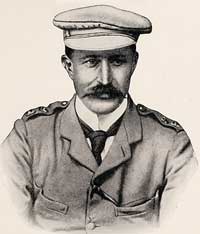
Major-General Sir Henry Jenner "Harry" Scobell, KCVO, CB was a British military leader who served as the last officer in command of Cape Colony before the formation of the Union of South Africa.

The Natal Government Railways (NGR) was formed in January 1877 in the Colony of Natal.

Robert Hamond Elwes was a Lieutenant in the Grenadier Guards famous for having died valiantly at the Battle of Laing's Nek, South Africa as immortalized in Elizabeth Thompson's painting, "Floreat Etona!" (1898).